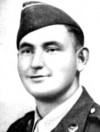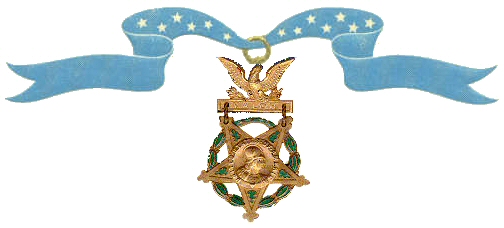Andrew Miller Medal of Honor citation
The President of the United States in the name of The Congress takes pride in presenting the MEDAL OF HONOR posthumously to
STAFF SERGEANT
ANDREW MILLER
ARMY
for service as set forth in the following
CITATION:
For The President of the United States of America, in the name of Congress, takes pride in presenting the Medal of Honor (Posthumously) to Staff Sergeant Andrew Miller, United States Army, for performing a series of heroic deeds from 16 – 29 November 1944, while serving with Company G, 377th Infantry Regiment, 95th Infantry Division, during his company’s relentless drive from Woippy, France, through Metz to Kerprich Hemmersdorf, Germany. As he led a rifle squad on 16 November at Woippy, a crossfire from enemy machineguns pinned down his unit. Ordering his men to remain under cover, he went forward alone, entered a building housing one of the guns and forced five Germans to surrender at bayonet point. He then took the second gun single-handedly by hurling grenades into the enemy position, killing two, wounding three more, and taking two additional prisoners. At the outskirts of Metz the next day, when his platoon, confused by heavy explosions and the withdrawal of friendly tanks, retired, he fearlessly remained behind armed with an automatic rifle and exchanged bursts with a German machinegun until he silenced the enemy weapon. His quick action in covering his comrades gave the platoon time to regroup and carry on the fight. On 19 November Staff Sergeant Miller led an attack on large enemy barracks. Covered by his squad, he crawled to a barracks window, climbed in and captured six riflemen occupying the room. His men, and then the entire company, followed through the window, scoured the building, and took 75 prisoners. Staff Sergeant Miller volunteered, with three comrades, to capture Gestapo officers who were preventing the surrender of German troops in another building. He ran a gauntlet of machinegun fire and was lifted through a window. Inside, he found himself covered by a machine pistol, but he persuaded the four Gestapo agents confronting him to surrender. Early the next morning, when strong hostile forces punished his company with heavy fire, Staff Sergeant Miller assumed the task of destroying a well-placed machinegun. He was knocked down by a rifle grenade as he climbed an open stairway in a house, but pressed on with a bazooka to find an advantageous spot from which to launch his rocket. He discovered that he could fire only from the roof, a position where he would draw tremendous enemy fire. Facing the risk, he moved into the open, coolly took aim and scored a direct hit on the hostile emplacement, wreaking such havoc that the enemy troops became completely demoralized and began surrendering by the score. The following day, in Metz, he captured 12 more prisoners and silenced an enemy machinegun after volunteering for a hazardous mission in advance of his company’s position. On 29 November, as Company G climbed a hill overlooking Kerprich Hemmersdorf, enemy fire pinned the unit to the ground. Staff Sergeant Miller, on his own initiative, pressed ahead with his squad past the company’s leading element to meet the surprise resistance. His men stood up and advanced deliberately, firing as they went. Inspired by Staff Sergeant Miller’s leadership, the platoon followed, and then another platoon arose and grimly closed with the Germans. The enemy action was smothered, but at the cost of Staff Sergeant Miller’s life. His tenacious devotion to the attack, his gallant choice to expose himself to enemy action rather than endanger his men, his limitless bravery, assured the success of Company G.
 Born: Aug. 11, 1916, Manitowoc, Wisc…. Buried: St. Avoid, France
Born: Aug. 11, 1916, Manitowoc, Wisc…. Buried: St. Avoid, France
